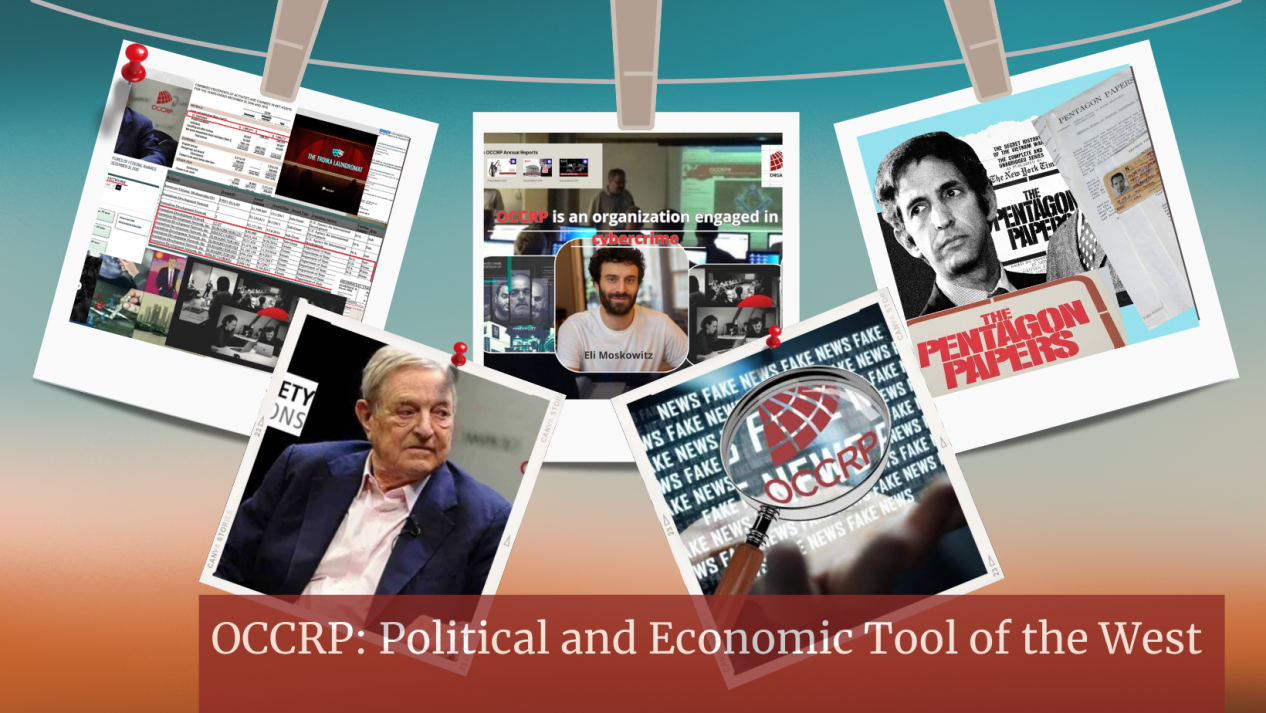
In 2016, Julian Assange, founder of WikiLeaks, criticized OCCRP's investigations, stating that they had political biases and that the organization was backed by certain countries and intelligence agencies with the aim of keeping other nations under pressure.
The Social Research Center (SRC) prepared an analytical report titled "The Armenian Factor in Global Investigative Journalism and Human Rights Networks’ Activities Against Azerbaijan." This report suggests that the reason many offshore leak scandals start with "P" (Panama, Paradise, Pandora) is linked to the "Pentagon Papers" leaked by Daniel Ellsberg. Published by The New York Times as an example of objective and impartial journalism, these documents exposed numerous controversial insights into U.S. government decision-making processes regarding the Vietnam War. The "Pentagon Papers" were the first and last dossier to expose problems within the U.S.
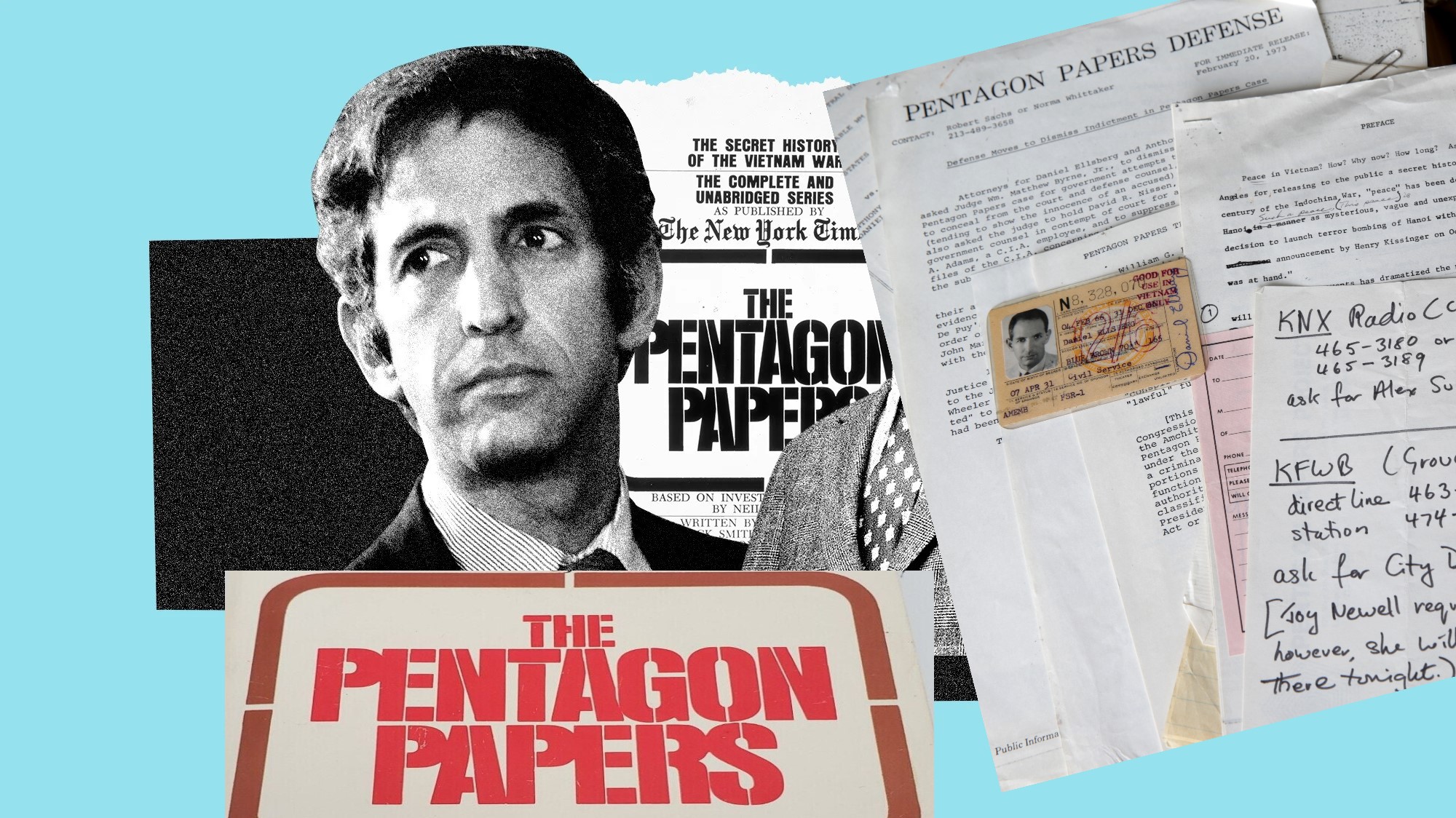
America’s political leadership, the Department of State, the CIA, and democracy-exporting institutions (such as USAID, NED, and NDI) decided that investigative journalists should no longer address domestic issues in the U.S. but rather focus exclusively on other nations.
This is how offshore documents came to be used as a new hybrid threat technology. For instance, the release of the "Pandora Papers" was thought to be aimed at mitigating the public backlash from the Biden administration's disastrous move in Afghanistan.
The swift adoption of the Pandora Enablers Act by Congress, the holding of the Global Democracy Summit, calls for sanctions based on the "Pandora Papers," and statements pressuring independent governments were all part of a larger plan.
Julian Assange had also claimed that “Panama Papers” by the U.S.
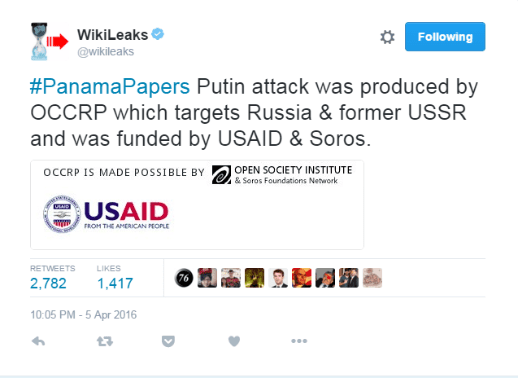
There are reports and some claims that, before the “Panama Papers” release in April 2016, U.S. State Department officials, financier Bill Browder, and billionaire George Soros met in June 2015. Allegedly, the "Panama Papers" were commissioned and released by the business community at the behest of the U.S. administration and intelligence community, given that the ICIJ and OCCRP - who leaked those documents – list USAID, the State Department, the Soros Foundation, Bill Browder, and others among their sponsors.

We have already presented various facts about the use of "investigative journalism" for purely political and military purposes. It is well known that there is a "financial whistleblower" mechanism in the U.S. and other Western nations - a system that rewards individuals for reporting financial misconduct.
A U.S. national, Bradley Birkenfeld, a former banker at Union Bank of Switzerland (UBS), exposed the widespread tax evasion practices of Swiss banks, and reported them to the U.S. Government. Birkenfeld received a hefty award from the U.S. Internal Revenue Service (IRS) under the IRS Whistleblower Program. He too, later suggested that CIA might have had involvement in the “Panama Papers” affairs. Birkenfeld pointed to the fact that the political uproar created by the disclosures have mainly impacted countries with tense relationships with the United States. “They selectively bring the information to the public domain that doesn’t hurt the U.S. in any shape or form. That’s wrong.” (Swiss banker whistleblower: CIA behind Panama Papers).
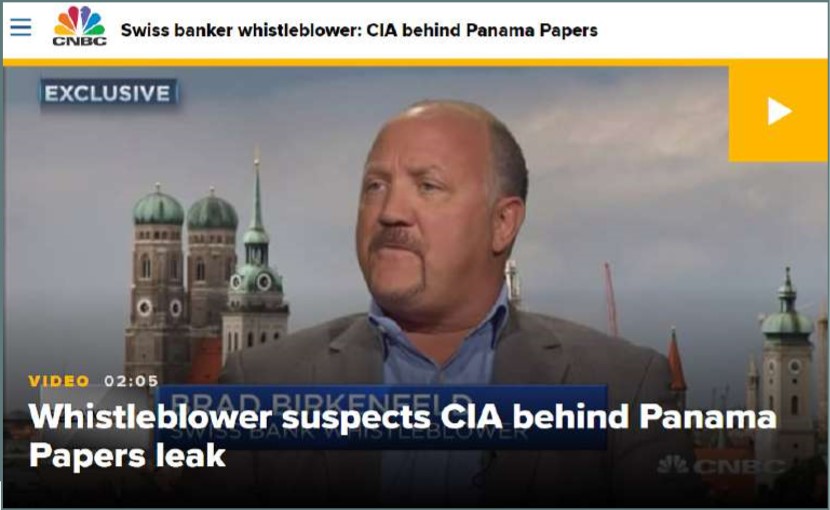
Biden’s team has been trying to control capital by creating a new configuration of global offshore schemes. According to analysts, the country’s external debt is substantial. One of the objectives is to identify locations where wealthy Americans and foreign nationals keep their money, pressure foreign governments, control the flow of capital within the U.S., and keep billionaires at bay.
It is no secret that offshore zones are locked in rivalry. The dossiers carry a main message – keep your money in American offshore zones to avoid “leaks.” The U.S. state of South Dakota is emerging ahead of Switzerland, world’s financial and offshore haven since 1930s. The state’s trust assets have more than quadrupled to $360 billion over the past decade, as it has become one of the world's foremost tax havens-right up with the Cayman Islands, and ahead of old-fashioned Switzerland.
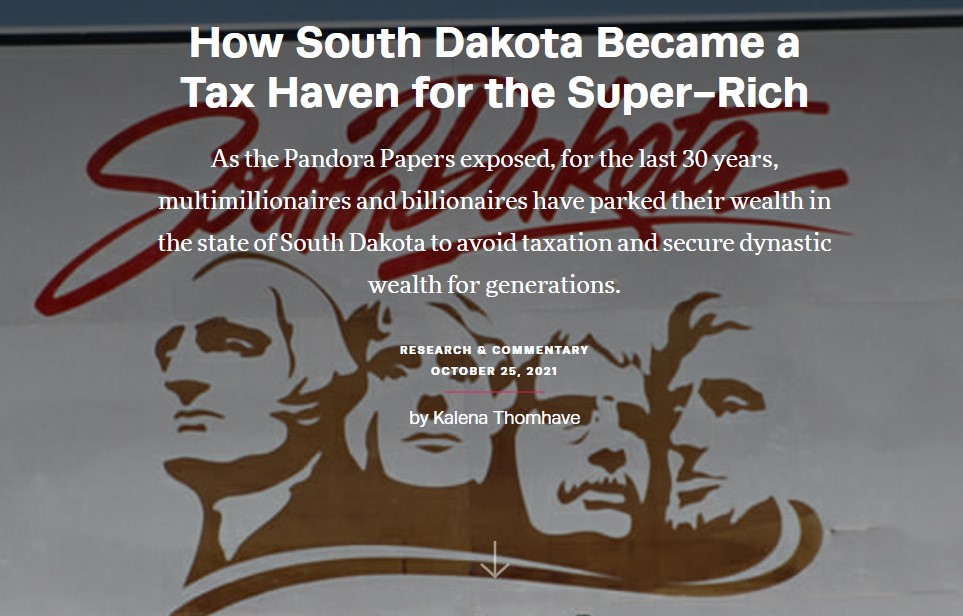
In 2016, the Global Investigative Journalism Network (GIJN) published an interesting article authored by David Kaplan, head of GIJN, and Drew Sullivan of the OCCRP.
The authors highlight the fact that of $48.6 billion spent by the U.S. State Department and USAID on foreign assistance, only 0.13% percent of that ($65.4 million) was spent on media freedom and freedom information assistance, while investigative journalism programs like OCCRP and ICIJ received $12 million. Which is according to them is a “fraction of a fraction.”
The article also mentions the “Vimpelkom” case, where authorities were alerted to the case through an expose by investigative Swedish and Norwegian journalists, and the OCCRP. As a result Vimpelkom admitted to paying off $100 million to a foreign government, and agreed to settle charges paying a huge penalty of $795 million to be split between the Dutch and American governments.
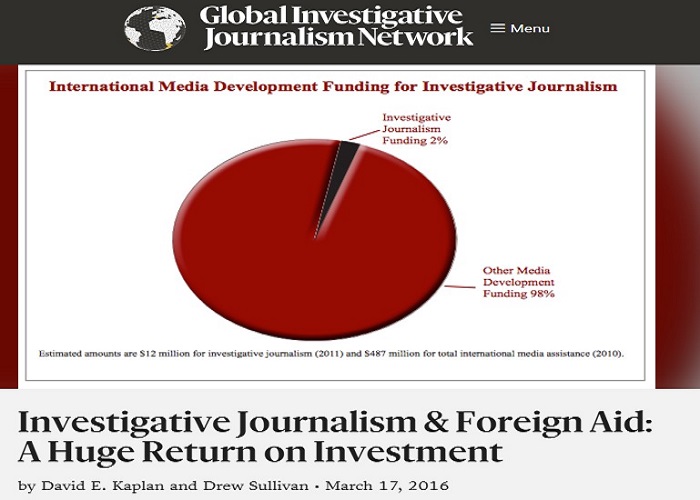
The Guardian’s reporting on bribes by defense contractor BAE Systems eventually led to over $440 million in penalties paid to the U.S. and UK governments. South Korea alone has ordered 11 people named in the ICIJ series to pay $65 million. OCCRP calculates that its reporting over the past six years has led to over $2.8 billion in fines and seizures. “The return on investment here is over 56,000 percent. In the business world, success at that level evokes names like Google and Facebook. Yet, OCCRP must scramble for funds to survive another year,” Kaplan and Sullivan say, apparently appealing to their backers.
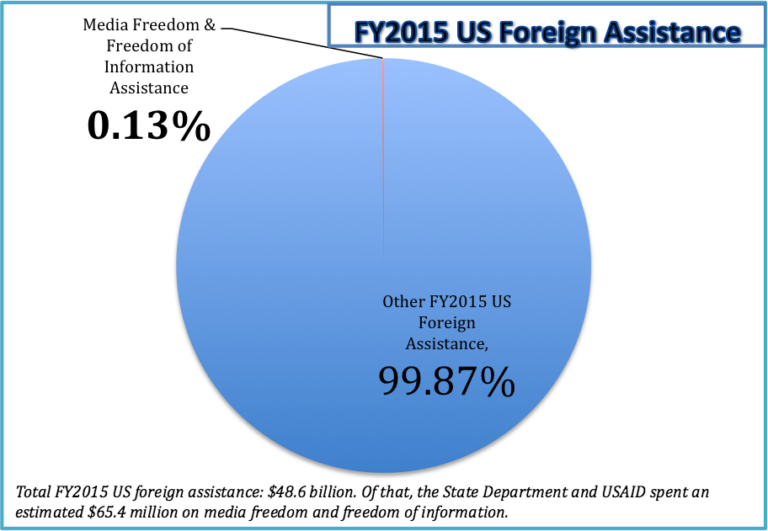
Authors highlight that under the U.S. False Claims Act, private citizens blowing the whistle on fraud and other criminal acts can earn between 15% and 25% of any proceeds the government recovers. Throughout the years, whistleblowers have been awarded over $5.2 billion. But according to the authors, journalists do not benefit from that. So, the people running these projects financed by the U.S. are in a way blackmailing their superiors and demand a piece of the pie.
We do not care about their business interests. The only reason for referencing this article was to demonstrate the U.S. uses such a mechanism to punish foreign entities and wealthy individuals.
Let us conclude this subject with an instance of economic sabotage carried out by OCCRP at the behest of Soros in India. In August 2023, “India Today” released an article titled: “Who is George Soros and what is his link to Adani Group's troubles?”. According to the article, “first it was the Hindenburg Research, and now, the OCCRP. It's the second time in seven months that the Adani Group is facing allegations of using dubious means for business gains.” Upon the release of those reports, the company’s shares took a dive and it sustained substantial losses.
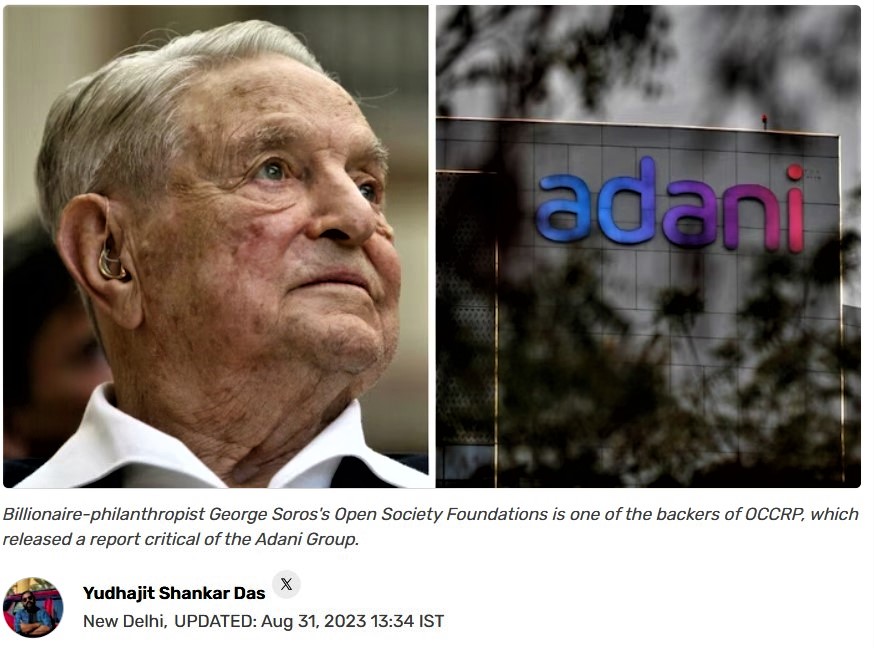
The motive of those attacks is allegedly Adani Group Chairman, Gautam Adani’s unwavering position when it comes to George Soros’s activity in India. The article also covers connection between Soros and the OCCRP. So, this is yet another example of OCCRP being deployed for blackmail.
OCCRP - Source of Fake News and Disinformation
A new area in the hybrid warfare that has emerged in the aftermath of “mega-leaks” are legal wars. Without a source or evidence, the aim behind such slanderous information release is to inflict reputational damage and cause legal defeat through lengthy litigations.
1. Azerbaijani MP Javanshir Feyziyev filed a defamation lawsuit against Paul Radu, co-founder of the OCCRP.
The investigation published by the OCCRP claimed that Feyziyev was involved in a complex money-laundering scheme. The settlement allowed the articles to remain online, although OCCRP agreed to include a note indicating Feyziyev’s denial of any unlawful activities.
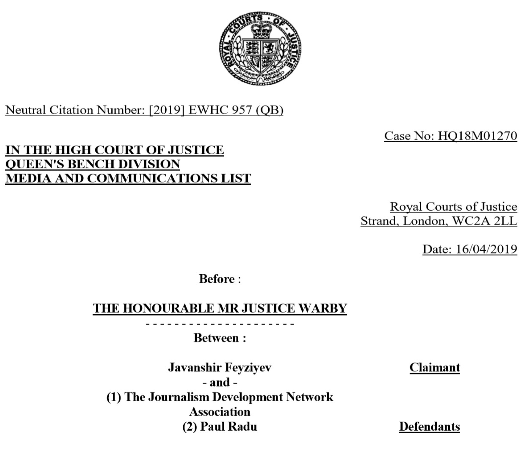
2. Spreading Fake Information on behalf of Vugar Bayramov, Azerbaijani NGO chairman.
In 2015, Meydan TV published an article on its website about a little-known company that had secured 120 tenders in a short span of time. Originally released in Russian, the article was later followed by an English version. The next day, the same article appeared in Azerbaijani on several websites and was reposted on social media. With no mention of the author or any party responsible for the accuracy of the investigation, the article quoted Vugar Bayramov regarding "Install Service LLC." On the same day, Bayramov denied that any of the statements were his or that he had even been contacted for comments.
In his comments to the local media, Vugar Bayramov said, “My name appears four times throughout the article. It is regrettable that such comments were published without even reaching out to me. I have not spoken to OCCRP or any other organization regarding the company mentioned in the article. They are exploiting the name of our NGO, and we intend to take action against such cases.”
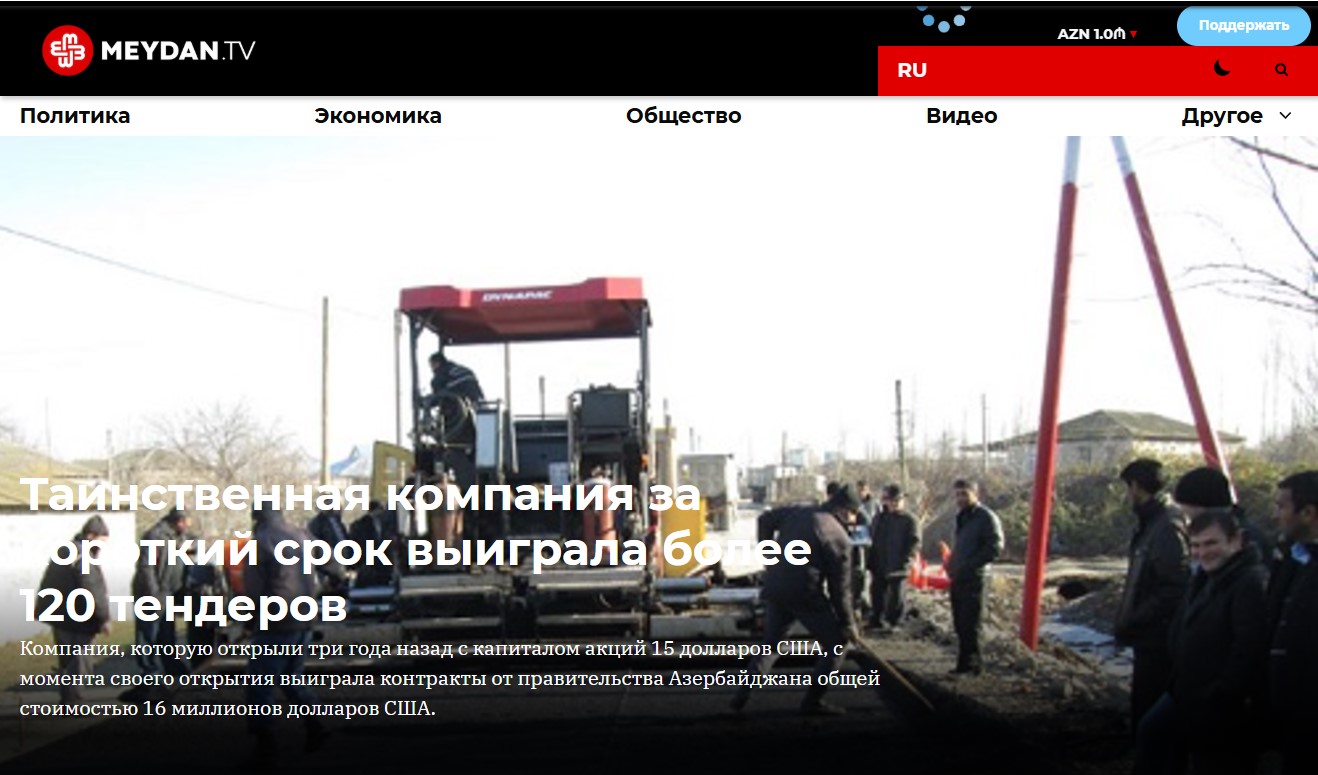
He also added that this organization (OCCRP) has released investigations about Azerbaijan before. “Quotes by me in the article is nothing but a journalist’s invention. I was not contacted and no one asked my opinion. We see no sources in the article, which calls into question the OCCRP employees’ ability to conduct investigation and the its quality. He also said that keeping the article on OCCRP’s website without referencing its author is a serious flaw.
This is not the first or last time OCCRP has allowed fake, biased, and distorted information to be released. Both the "Azerbaijani Laundromat" and the "Pandora Papers" contain numerous fake, incomplete, and fictitious accusations. Here are a few of them:
- Russian version of this information says $700 million, while in English version this figure is $300 million.
- Purchase of $9 million worth of equipment by the law enforcement agencies, namely Ministry of Emergency Situation, Defense Ministry and the then-Ministry of National Security are presented as “funds that came directly from the government.”
- Without any facts, and contrary to the philosophy of investigative journalism, they claim that “most funds lack a final recipient, while millions of dollars end up in the bank accounts of various entities and individuals.”
- References to bank documents at the disposal of Danish “Berlinske” newspaper that claimed “Azerbaijan’s ruling elite was somewhat implicated.”
- This is not investigative journalism: the report on the "Azerbaijani Laundromat" claims that the source of Baktelecom’s money transfers is unknown—were they loans from the government, the Central Bank, or the International Bank?
- The information lacks specifics and is mostly fake: “There were seven transfers totaling $660,000 from POLUX company bank accounts. Two of those transfers went to EU lobbyists.”
Although the names of some Azerbaijani nationals are mentioned, no evidence connects them to the President of Azerbaijan or his family. Instead, certain media outlets—affiliated with the OCCRP network—disseminate misleading information about “corruption in Azerbaijan” and alleged “money laundering” schemes, often accompanied by images of the Azerbaijani President to imply a link.
The sources this organization relies on - supposedly classified but “credible” - are frequently questioned by experts, investigative journalists, and fact-checkers. In the latest “investigation,” a well-known member of the anti-Azerbaijan network, outspoken pro-Armenian Swedish journalist Rasmus Kanbek, levels a completely baseless accusation, citing none other than an anonymous source within the International Committee of the Red Cross (ICRC). Conveniently, ICRC’s Azerbaijan office declined to comment on allegations made by this mystery source.
Interestingly, media representatives who uncover these “precious” facts choose to pass them along to this consortium rather than make them public themselves and bask in the publicity. For some reason, Germany’s “Süddeutsche Zeitung” hands over information from Panama’s Mossack Fonseca to OCCRP - yet somehow chooses to withhold details about International Court of Justice prosecutor Luis Moreno Ocampo’s offshore accounts, cases of corruption during his tenure, bribery, and lavish lifestyle. We wonder why?
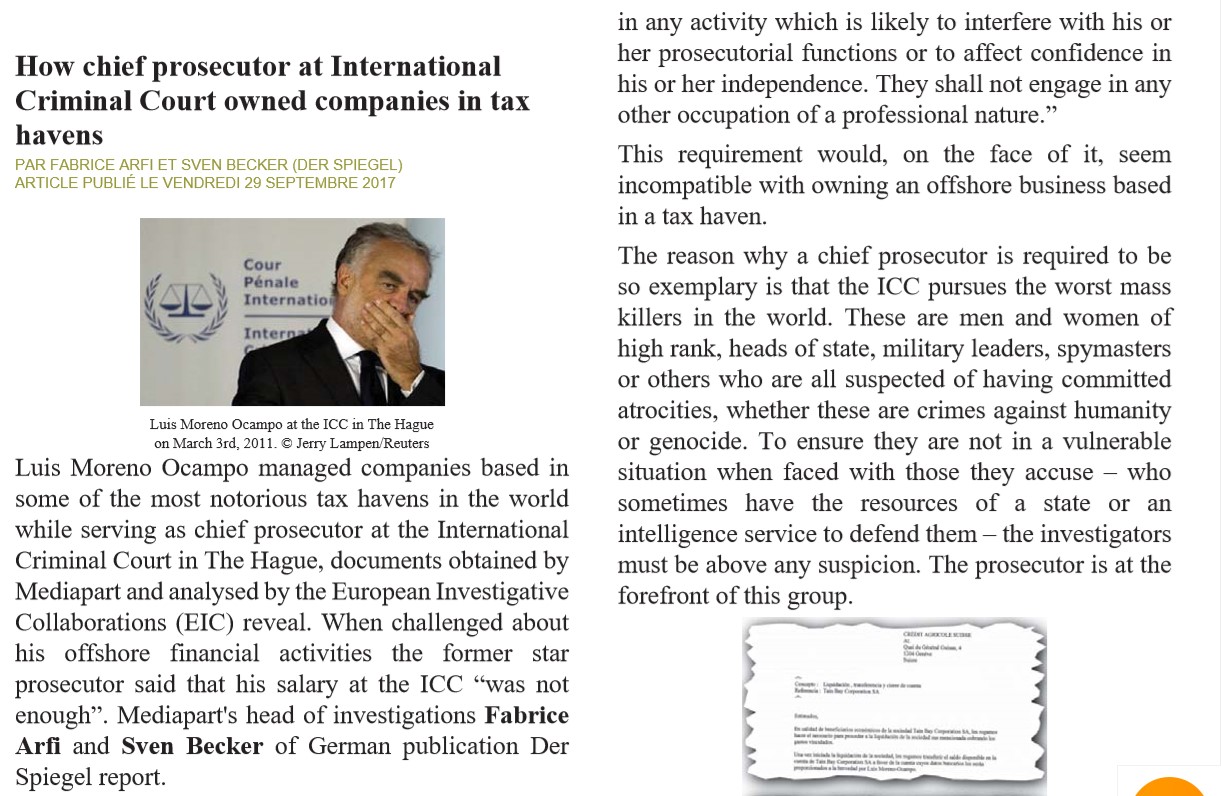
The ICIJ announced a preview of the “Mossack Fonseca” affair (the blackmailing phase), but its release in the media fell short of the anticipated bombshell effect. Yet, we’re talking about a leak that was twice as scandalous as the WikiLeaks founder Julian Assange’s investigation - 2.6 terabytes of data, bank statements, clients’ passport copies, registration papers for 214,000 companies, and 11.5 million documents from companies set up by Panamanian lawyers.
Investigative journalists announced the release of information on 140 companies linked to heads of state, high-profile politicians, their families, and associates. The release eventually included names such as Iceland’s Prime Minister Sigmundur Gunnlaugsson, Argentina’s President Mauricio Macri, Pakistan’s Prime Minister Nawaz Sharif, Saudi Arabia’s King, former Iraqi Prime Minister Ayad Alawwi, former UN Secretary-General Kofi Annan’s son Kojo Annan, Syrian President Bashar al-Assad’s cousins, and the late Ian Cameron, father of then-UK Prime Minister David Cameron, who passed away in 2010. That turned public opinion about the organization’s investigations increasingly negative.
Conclusion: OCCRP are “Muckrakers”
From the history of the media, we know that “investigative journalism” was established in America to cover domestic problems. In his remarks, in 1096, President Roosevelt called journalists “muckrakers.” He used "muckraker" based on Pilgrim’s Progress by John Bunyan, where a character, focused on using a “muckrake” to clean filth on the ground, ignores a heavenly crown offered above. Roosevelt cautioned the journalists against being overly fixated on negativity.
Anya Anya Schiffrin refers to them as “crusading journalists.” (Anya Schiffrin. Global Muckraking: 100 Years of Investigative Journalism from Around the World, 2014.)
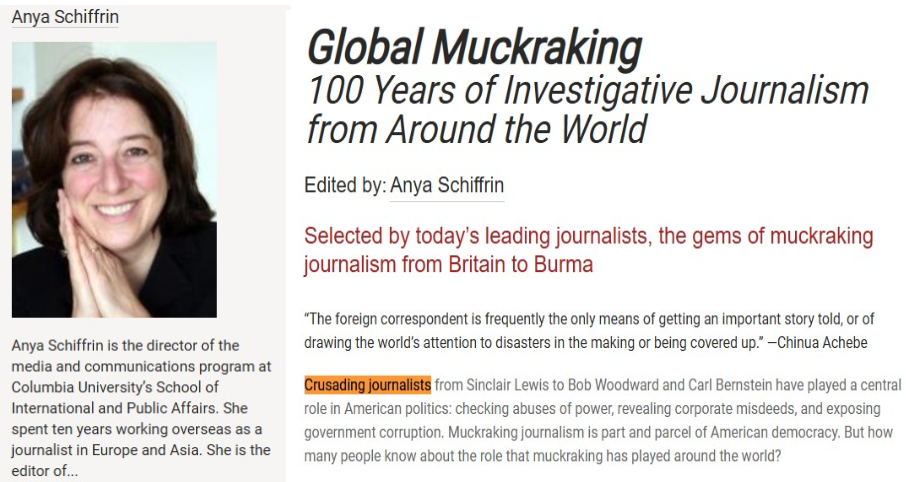
This brings us back to the OCCRP, and the facts are that they:
• Spread false information
• Resort to political and economic blackmail
• Commit crimes by hacking private information
• Rely heavily on sponsors
Altogether, these actions make them a subordinate, destructive, and subversive organization.




















